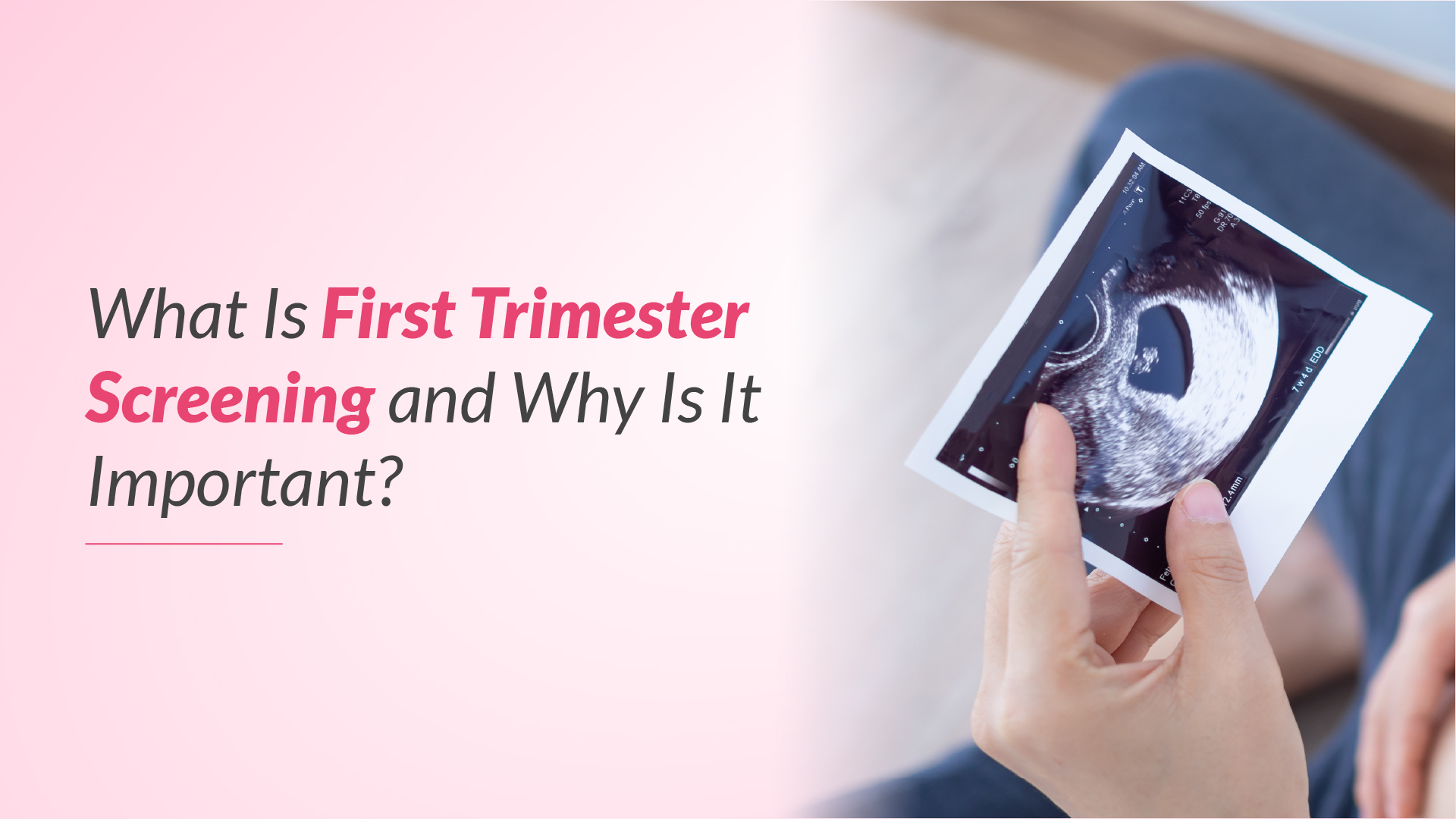What Is First Trimester Screening and Why Is It Important?
Reviewed By: Dr. Nayani Enjamoori, a fertility specialist at Ferty9 Fertility Center, Karimnagar
Pregnancy is an incredible journey, an experience filled with joy, anticipation, and sometimes, uncertainty. As expectant parents navigate this transformative experience, it's crucial to keep a watch on the health & well-being of both the mother and the developing baby. One of the essential steps in ensuring a healthy pregnancy is undergoing first-trimester screening, a series of tests designed to assess potential risks and identify any possible concerns early on. This comprehensive article will explore the intricacies of first-trimester screening, its importance, and what to expect throughout the process.
What is First Trimester Screening?
First-trimester screenings are non-invasive tests performed during the first three months of pregnancy, typically between weeks 11 and 14. These tests aim to evaluate the risk of certain chromosomal abnormalities and other potential complications that could affect the developing fetus. The screening process involves an amalgamation of ultrasound examinations and blood tests, providing valuable insights into the baby's growth and development.
Steps of First Trimester Screening
Ultrasound Examination
The ultrasound examination is a crucial component of first-trimester screening. During this procedure, a trained technician or doctor uses a specialized device to create detailed images of the developing fetus. The ultrasound examination allows for the following assessments:
- Measurement of the Nuchal Translucency (NT): This measurement involves assessing the thickness of the fluid-filled space at the back of the baby's neck. An increased NT measurement may indicate a higher risk of chromosomal disorders, like Down syndrome.
- Evaluation of Foetal Anatomy: The ultrasound technician will carefully examine the baby's anatomy, including the head, brain, heart, and other vital organs, to identify any potential structural abnormalities or developmental concerns.
- Foetal Movement and Heartbeat: The ultrasound also allows doctors to monitor the baby's movements and check for a healthy heartbeat, reassuring the fetus's well-being.
Blood Tests
In addition to the ultrasound examination, first-trimester screening typically includes two blood tests:
- Pregnancy-associated Plasma Protein-A (PAPP-A): This test measures the specific protein level produced by the placenta during pregnancy. Abnormal levels of PAPP-A can indicate an increased risk of certain chromosomal abnormalities or pregnancy complications.
- Human Chorionic Gonadotropin (hCG): This test measures the level of a hormone produced by the placenta during early pregnancy. Abnormal hCG levels can also be associated with an increased risk of certain chromosomal abnormalities or pregnancy complications.
Suggested Read: Understanding beta hCG pregnancy test
Risk Assessment
After the ultrasound examination and blood tests, doctors will combine the results to calculate the overall risk of chromosomal abnormalities, such as Down syndrome, trisomy 18, and trisomy 13. This risk assessment considers various factors, including the mother's age, the NT measurement, and the levels of PAPP-A and hCG.
Follow-up Procedures (If Needed)
Doctors may recommend additional follow-up procedures if the first-trimester screening results indicate an increased risk of chromosomal abnormalities or other potential concerns. These may include:
- Genetic Counseling: A genetic counselor can provide guidance, support, and further information about the potential risks and available options.
- Diagnostic Tests: Additional investigations, such as chorionic villus sampling (CVS) or amniocentesis, may be ordered to confirm or rule out specific chromosomal abnormalities or other genetic conditions.
- Specialized Fetal Monitoring: Depending on the identified concerns, doctors may recommend additional ultrasound examinations or other monitoring techniques to track the baby's development closely.
Why is First Trimester Screening Important?
First-trimester screening plays a crucial role in ensuring a healthy pregnancy and providing expectant parents with valuable information and peace of mind. Here are some key reasons why this screening is so important:
Early Detection of Potential Issues
One of the primary advantages of first-trimester screening is its ability to detect issues (if present) early in the pregnancy. By identifying potential risks or concerns during the first trimester, doctors can take proactive steps to monitor the situation closely & make informed decisions about managing the pregnancy.
Informed Decision-making
The results of first-trimester screening provide expectant parents with knowledge and susceptibility to the potential risks associated with their pregnancy. Armed with this knowledge, the parents can make informed decisions about the pregnancy, including whether to pursue further diagnostic testing or seek additional medical support.
Reduced Anxiety and Uncertainty
Pregnancy is a time of heightened anxiety and uncertainty, particularly for first-time parents or those with a history of complications. First-trimester screening can help alleviate some of these concerns by providing reassurance or identifying potential issues early on, allowing for appropriate interventions and support.
Improved Pregnancy Management
Doctors can tailor the pregnancy management plan accordingly when potential risks or concerns are identified through first-trimester screening. This plan may involve closer monitoring, specialized care, or recommendations for lifestyle modifications to optimize the health and well-being of both the mother & the developing baby.
Opportunity for Early Intervention
Early intervention is crucial if doctors detect significant concerns during the first trimester of pregnancy. This may involve seeking specialized medical care, exploring potential treatment options, or considering alternative paths forward, such as termination of the pregnancy, depending on the individual circumstances and personal preferences.
Enhanced Preparation for Birth
First-trimester screening can provide valuable insights into the baby's development and potential challenges that may arise during or after birth. This information can help expectant parents and doctors prepare for any necessary interventions or specialized care that may be required, ensuring a smoother transition into parenthood.
Understanding Risk Factors
The results of first-trimester screening can also shed light on potential risk factors that may influence the pregnancy or the baby's development. This knowledge can guide doctors in effectively providing tailored advice and recommendations for managing these risks.
What Happens After a First Trimester Screening?
The next steps after a first-trimester screening depend on the individual results and the doctor's recommendations. Here are some potential scenarios:
- Low-risk Results: If the screening results indicate a low risk of chromosomal abnormalities or other concerns, the pregnancy will typically proceed with routine prenatal care and monitoring.
- Increased Risk Results: If the screening results suggest an increased risk of certain conditions, doctors may recommend additional diagnostic tests, such as chorionic villus sampling (CVS) or amniocentesis, to confirm or rule out specific concerns.
- Abnormal Findings: In cases where the screening identifies potential abnormalities or significant concerns, doctors will provide counselling and support to help expectant parents understand their options and make informed & better decisions about the next steps.
Regardless of the screening results, expectant parents must maintain open communication with their doctors and attend all scheduled prenatal appointments for ongoing monitoring and support throughout the pregnancy.
Benefits and Limitations of First Trimester Screening
While first-trimester screening offers numerous benefits, it's essential to understand its limitations and the potential implications of the results:
Benefits:
- Non-invasive and relatively low-risk procedure
- Provides valuable information about potential risks and concerns
- Allows for early intervention & proactive management of the pregnancy
- Offers peace of mind and reduces anxiety for expectant parents
- Facilitates informed decision-making about further testing or medical interventions
Limitations:
- Screening tests cannot provide definitive diagnoses; they only assess the risk of certain conditions.
- False positive & false negative results are possible, leading to potential misinterpretation of the risks.
- The screening process may not detect all potential abnormalities or complications.
- Additional diagnostic tests may be required for confirmation, which carries a small risk of complications.
- The emotional impact of screening results can be significant, particularly in increased risk or abnormal findings.
It's crucial for expectant parents to discuss the benefits and limitations of first-trimester screening with their doctor and to understand that the screening results are not a definitive diagnosis but rather a tool to guide further decision-making and pregnancy management.
Conclusion
First-trimester screening is an invaluable tool in ensuring a healthy pregnancy and providing expectant parents with valuable insights into the well-being of their developing baby. This non-invasive screening process can identify potential risks and concerns early on, allowing for proactive management, informed decision-making, and tailored care throughout the pregnancy.
While first-trimester screening cannot provide definitive diagnoses, it offers a crucial window into the fetus's development. It helps doctors and expectant parents make informed choices about further testing or interventions. By embracing this screening opportunity, expectant parents can embark on their pregnancy journey with greater confidence, peace of mind, and the assurance that they are taking proactive steps to ensure the best possible outcome for themselves and their baby.

Write your message


